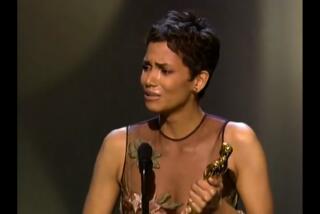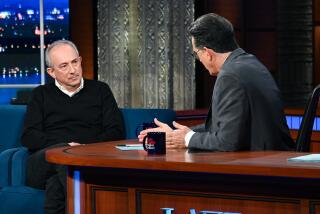Thanks for everything, thanks for nothing
- Share via
A LONG-STANDING friend who published a book last year left me out of his acknowledgments. We had discussed his work-in-progress over the years, and I had commented extensively on the finished manuscript, so I was surprised. There were some nasty, recrimination-filled e-mails between us, and we haven’t spoken to each other since.
But the snub got me thinking: What are acknowledgments anyway? Do clear, accepted rules govern their use in publishing culture?
Dave Eggers sends up the conventional form in his hyperbolically long acknowledgments that go on for dozens of pages in “A Heartbreaking Work of Staggering Genius.” “The author wishes to acknowledge the existence of a planet just beyond Pluto,” etc. Very funny, but most of us treat acknowledgments more straightforwardly, in the common dictionary sense: As an expression of appreciation or gratitude.
I consulted several manuals of style for guidance, but they only stressed care in citing sources, archives, photos, data and the like, lest the author flirt with plagiarism or copyright infringement. There was little or nothing about personal acknowledgments.
The writer’s great Baedeker, “The Elements of Style” by William Strunk Jr. and E.B. White, is also silent on the subject, but the third edition has White’s expression of gratitude to the legendary editor of proofs at the New Yorker, the late Eleanor Gould Packard, “for her assistance in the preparation of the second edition.” In their preface to the Modern Language Assn.’s “Handbook for Writers of Research Papers,” the editors declare the impossibility of listing everyone connected with the book, but they then go on to fill a page with thanks -- to 111 individuals by my count.
Writers of fiction and poetry toil in solitary workshops, their own imagination and personal experience providing most of the assistance they need. As a general rule, acknowledgments don’t appear in their works.
Several books at my bedside illustrate the point, among them Julio Cortazar’s “Blow-Up and Other Stories” and Ludmila Ulitskaya’s “Medea and Her Children.” You’d think at the very least the translators would mention help in rendering a peculiar turn of phrase, an idiom or a difficult play on words from the original, but no.
There are some exceptions, also from my bedside. Gary Shteyngart, author of “The Russian Debutante’s Handbook” thanks six people, each for some particular assistance, such as “launching me into the world of letters.” To another, he offers thanks “for everything.”
And Philip Roth, in the “Note to Readers” of his lengthy “Postscript” to “The Plot Against America,” offers those “interested in tracking where historical fact ends and historical imagination begins” a list of sources, a chronology of major and minor historical figures and some documentation. He doesn’t acknowledge it as an acknowledgement, but in effect it is.
Roth’s “Postscript” is a model for writers of historical fiction. But I would go further. All writing in some sense distills personal contributions of different kinds and should be acknowledged.
Querying author friends and surveying a range of works I’ve read recently, I found that acknowledgments are very, very variably distributed, both in kind and number. There are thanks for moral support and encouragement (Michael Shapiro’s wife is acknowledged for her “saintly virtues” in his book “The Last Good Season”), for helpful suggestions (as befits a psychotherapist sensitive to people’s feelings, Jeffrey B. Rubin offers a page of appreciation to individuals in “The Good Life”), and for taking the time to read the manuscript, even when the reader disagreed with the author (Peter Kenez has cordial thanks for those whose interpretations were “very different” from his in “Cinema and Soviet Society”).
Some acknowledgments are compressed into a short paragraph; some fill a page or more. Some people thank their babysitters; others thank ex-girlfriends. Sometimes, let’s face it, the author uses the section politically, to curry favor with someone, or to avoid being reviewed by someone, or simply to advance a career by dropping a name. Naming names also may be a form of vanity -- look how many luminaries the author knows! Inversely, there’s vanity in not naming names -- the author didn’t need help.
Whimsy is not unknown. According to the Wall Street Journal, Jonathan Santlofer thanked his friend Diane Keaton for helping his “The Killing Art” even though he and she agreed she hadn’t actually contributed to the creation of the book in any way.
Publishers have complained about overdone acknowledgments, but in the absence of any formal guidance, it’s up to the author’s temperament and disposition to decide -- and that’s what separates the stingy from the generous.
Aside from learning about my bedside reading habits, you may have guessed that I sympathize with those who are more generous. In time, I’ll get over my friend’s acknowledgment snub (and maybe we’ll renew our friendship). Meanwhile, dear authors, please consider good grace and simple courtesy as self-evident norms when you draw up your acknowledgments.
More to Read
Sign up for our Book Club newsletter
Get the latest news, events and more from the Los Angeles Times Book Club, and help us get L.A. reading and talking.
You may occasionally receive promotional content from the Los Angeles Times.






